新概念第一册_第43课 10 月19
新概念英语第一册43课
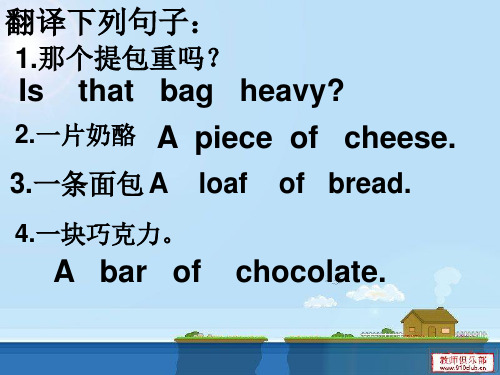
英国人喝茶比较定时,不像中国人那样 随时随地都可以喝茶。英国人习惯于三 餐两茶。每天,人们工作、学习一段时 间后,需要停下来休息一刻钟左右,喝 杯茶,吃点东西,这段时间叫 Tea Break(茶休),茶休一般为一天两次: Morning Tea(上午茶)和 Afternoon Tea(下午茶)。 上午茶一般在10点半 左右,下午茶一般在下午 4、5点钟时,
一些
some用于肯定句。
any 用于否定句和 疑问句。
There is some water in the cup.
but 表示转折, 前后两句意思相 反。看书上原话
There it is .就在那。 Here it is. 就在这。
in front of 在……的前面。(在 某事物外的前面) in the front of在……的前部 (在某事物本身的前部)
喝下午茶的习惯源于英国 18世纪的一位女 公爵 Duchess of Bedford,她每天在午 餐和晚餐之间总感到有点饿,于是就在每 天下午 4点到 5点之间喝点茶,吃点点心、 三明治等,这种饮食法马上在英国盛行起 来,成为今天的 Afternoon Tea。茶休在 英国是“雷打不动”的休息时间,这在别 的西方国家是没有的。 英国人喝茶与中国 人不同。中国人大多喜欢喝清茶,即不往 茶里加任何东西;而在英国,人们主要喝 奶茶,
Homework:抄写 43课课文两遍,并 背诵前半部分。
Is there :there be 句型的一般疑问 句形式。 There is+可数名词单数\不可数名词。 There is a banana on the table . There is some milk in the glass. There are +可数名词复数 There are some birds in the tree.
新概念一lesson43-48课文及知识点
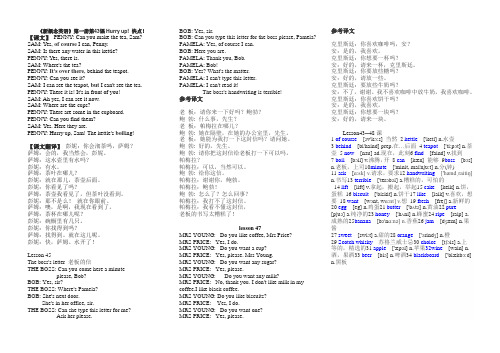
《新概念英语》第一册第43课Hurry up! 快点!【课文】PENNY: Can you make the tea, Sam? SAM: Yes, of course I can, Penny.SAM: Is there any water in this kettle? PENNY: Yes, there is.SAM: Where's the tea?PENNY: It's over there, behind the teapot. PENNY: Can you see it?SAM: I can see the teapot, but I can't see the tea. PENNY: There it is! It's in front of you!SAM: Ah yes, I can see it now.SAM: Where are the cups?PENNY: There are some in the cupboard. PENNY: Can you find them?SAM: Yes. Here they are.PENNY: Hurry up, Sam! The kettle's boil ing! 【课文翻译】彭妮:你会沏茶吗,萨姆?萨姆:会的,我当然会,彭妮。
萨姆:这水壶里有水吗?彭妮:有水。
萨姆:茶叶在哪儿?彭妮:就在那儿,茶壶后面。
彭妮:你看见了吗?萨姆:茶壶我看见了,但茶叶没看到。
彭妮:那不是么!就在你眼前。
萨姆:噢,是啊,我现在看到了。
萨姆:茶杯在哪儿呢?彭妮:碗橱里有几只。
彭妮:你找得到吗?萨姆:找得到。
就在这儿呢。
彭妮:快,萨姆。
水开了!Lesson 45The boss's letter 老板的信THE BOSS: Can you come here a minuteplease, Bob?BOB: Yes, sir?THE BOSS: Where's Pamela?BOB: She's next door.She's in her office, sir.THE BOSS: Can she type this letter for me?Ask her please. BOB: Yes, sir.BOB: Can you type this letter for the boss please, Pamela?PAMELA: Yes, of course I can.BOB: Here you are.PAMELA: Thank you, Bob.PAMELA: Bob!BOB: Yes? What's the matter.PAMELA: I can't type this letter.PAMELA: I can't read it!The boss's handwriting is terrible!参考译文老板:请你来一下好吗?鲍勃?鲍勃: 什么事,先生?老板:帕梅拉在哪儿?鲍勃: 她在隔壁,在她的办公室里,先生。
新概念第43课课文

新概念第43课课文
摘要:
1.新概念第43 课课文概述
2.文章的主要内容和结构
3.文章的核心观点和结论
正文:
新概念第43 课课文概述
新概念第43 课课文是一篇关于人类行为和心理的科学文章。
文章主要讨论了人们是如何感知和处理信息的,以及如何通过学习和训练来改变和优化这种感知和处理方式。
文章的主要内容和结构
文章首先介绍了人类感知和处理信息的方式,包括视觉、听觉、触觉等。
然后,文章通过实例说明了人们在不同情况下是如何感知和处理信息的,比如在阅读、驾驶、做决策等方面。
接着,文章讨论了学习和训练对感知和处理信息的影响,包括如何通过训练来提高某种感知能力,如何通过学习来改变对某种信息的处理方式等。
最后,文章总结了人类感知和处理信息的特点和局限,以及如何通过科学的方法和态度来优化和提高这种能力。
文章的核心观点和结论
文章的核心观点是,人类的感知和处理信息能力是可以通过学习和训练来改变和优化的。
新概念英语第一册笔记新版:第43课

Lesson 127 A famous actressKaren Marsh looks old.Karen Marsh doesn't look old.Doesn't Karen Marsh look old!I read she's only twenty-nine, but she must be at least forty. I'm sure she is.She was a famous actress when I was at school.When I was at school, she was a famous actress.That was a long time ago.Not that long ago!I'm not more than twenty-nine my self.[课⽂]Can you recognize that woman, Liz?I think I can, Kate.It must be Karen Marsh, the actress.I thought so.Who's that beside her?That must be Conrad Reeves.Conrad Reeves, the actor?It can't be.Let me have another look.I think you're right!Isn't he her third husband?No. He must be her fourth or fifth.Doesn't Karen Marsh look old!She does, doesn't she!I read she's twenty-nine, but she must be at least forty.I'm sure she is.She was a famous actress when I was still at school. That was a long time ago, wasn't it?Not that long ago!I'm not more than twenty-nine myself.Does Karen Marsh look old!Lesson 129 Seventy miles an hour[词汇]wave v. 招⼿track n. 跑道mile n. 英⾥overtake(overtook/overtaken) v. 从后⾯超越,超车speed limit 限速dream v. 做梦,思想不集中sign n. 标记,牌⼦driving licence 驾驶执照charge v. 罚款darling n. 亲爱的wave n. 波wave to sb.wave sb. goodbyeThat policeman is waving to you.over-overconfident [⾃负]overfish [滥捕]overbuild [滥建]oversleep [睡过头]I was late yesterday. I overslept.overeat [吃多了]overcharge [收费过多]overdress [打扮的太夸张了]Look, Gary!That policeman's waving to you.I want you to stop.That policeman wants Gary to stop.Where are you?race match/competition/championship/tournament on the race trackYou must have been driving at seventy miles an hour.I can't have been driving at seventy miles an hour. Did you see the speed limit?Didn't you see the speed limit?I'm afraid I didn't.I must have been dreaming.He wasn't dreaming.tell sb. to do sth.I always tell you to drive slowly.My wife told me to drive slowly yesterday.at that time/momentI was telling him to drive slowly at that time.Let me see your driving licence.I won't charge you this time.You'd better drive slowly next time.You'd better not do that again!I'll certainly be more careful.I told you to drive slowly.You always tell me to drive slowly, darling.take one's adviceYou'd better take my advice next time![课⽂]Look, Gary!That policeman's waving to you.He wants you to stop.Where do you think you are?On a race track?You must have been driving at seventy miles an hour.I can't have been.I was doing eighty when I overtook you.Didn't you see the speed limit?I must have been dreaming.He wasn't dreaming, officer.I was telling him to drive slowly.That's why I didn't see the sign.Let me see your driving licence.I won't charge you this time.But you'd better not do it again!Thank you.I'll certainly be more careful.I told you to drive slowly, Gary.You always tell me to drive slowly, darling.Well, next time you'd better take my advice!He is a student. She is beautiful.表语=主语从句Let sb. do sth.tell sb. to do sth.take one's adviceLesson 131 Don't be do sure![词汇]Egypt n. 埃及abroad adv. 国外worry v. 担忧go abroad/study abroadworry about[课⽂]Where are you going to spend your holidays this year, Gary? We may go abroad.I'm not sure.My wife wants to go to Egypt.I'd like to go there, too. [would like]We can't make up our minds.Will you travel by sea or by air?We may travel by sea.It's cheaper, isn't it?It may be cheaper, but it takes a long time.I'm sure you'll enjoy yourselves.Don't be so sure.We might not go anywhere.My wife always worries too much.Who's going to look after the dog?Who's going to look after the house?Who's going to look after the garden?We have this problem every year.In the end, we stay at Home and look after everything! decide to do sth.make a (big) decisiondetermine to do sth./determinedI'm determined to do sth.make up one's mine (to do sth.)decide to do sth./make a decisiondetermine to do sth.be determined to do sth.I have made up my mind to study English well.补充材料 P351 may come2 must I do3 must have been ill4 may have finished5 may have been sleeping6 needn't worry about anything7 must study hard8 can't be … must beP34cross my heart 发誓just for haugh 只是开玩笑pull one's leg 欺骗某⼈,开玩笑,逗某⼈玩⼉miss the bus/boat 错过机会Least talk, most work. 少说多做Never do things by halves. 不要半途⽽废You are quite right.That's my opinion, too.That's exactly what I want to say.You said it!You can say that again.For sure! I can't agree more.To a certain extent, yes, but …Yes, corect in a sense, but there're other problems.I don't think so.I'm not sure if I agree with you.I'm afraid I have a different opinion.I can't say that …I see your point, but …I can't go along with your view.P33 Exercises1 Someone2 everywhere/anywhere3 everyone4 was doing5 was reading6 is singing7 plays8 had arrived at9 will visit10 got to/had begun11 was12 were watching13 keeps/kept/is keeping [I was a student. I went there.]14 have never seenP32Excuse me. Do you know the way to …?I want to go to … Where is it?Which is the way to …Can you tell me how can I get to …/ how to ….Would you please show me the way?Can you direct me to …Is this the way to …Follow your nose and you'll find the station.Go along/down/ahead until you reach …Turn left/right at the first turning/crossingTake the first turning on your right.When you see the traffic lights, turn left.Keep going before you come to …It's just across the street/around the corner/opposite the shop/next to the school. You will have to get off at … stop.Is it far from here? How far is it?It's only about ... far (away).It's not very far. You can walk within ... minutes. It's about five minutes' walk. You can take No.3 bus to get there.It will take you half an hour to get there by bike.P31 Exercises1 Someone/Somebody2 everywhere3 nothing4 None5 Everyone6 any [some of the children]7 anything8 anyone1 in2 on3 off4 except5 to6 in7 for [on sale]8 for9 like10 in。
新概念一英语Lesson43 Hurry up(ppt课件)
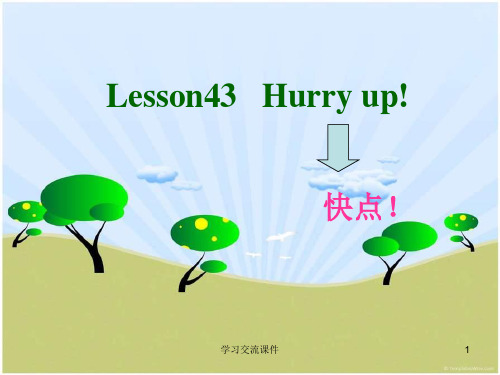
学习交流课件
16
疑问句句型分为:一般疑问句句型和特殊疑问句句型两 种类型。
1、一般疑问句句型为: Can+主语+动词原形+其它。 表示"某人会(能,可以)做……吗?"
你可以为我们大家唱一首英语歌吗?
Can you sing an English song for us?
是的,我可以。
Yes I can . No , I can't
奥,是啊。我现 Ah yes ,I can see it now !
在看到了
学习交流课件
8
Where are the cups? There are some in the cupboard. Can you find them? Yes. Here they are. Hurry up, Sam! The kettle's boiling!
我能游泳 I can swim 。
学习交流课件
15
2、否定句型: 主语+can not(can't/cannot)+动词原形+其它。
表示某人不会做.......不可能....
我不会骑摩托车。
I can't ride a motorbike .
韩梅不可能在教室里。 Han Mei can't be in the classroom.
• 例如:
• You can't play football in the street.不准在马路上踢足 球。
学习交流课件
12
• ③情态动词can的过去式could,用于现在时,可使语气更委 婉、更客气。
• 例如:
• Could you help me with my English? • 你能帮助我学习英语吗?
新概念第43课课文
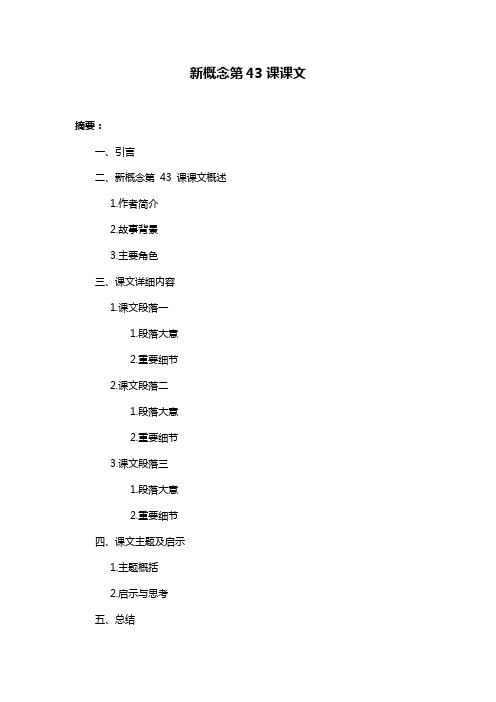
新概念第43课课文摘要:一、引言二、新概念第43 课课文概述1.作者简介2.故事背景3.主要角色三、课文详细内容1.课文段落一1.段落大意2.重要细节2.课文段落二1.段落大意2.重要细节3.课文段落三1.段落大意2.重要细节四、课文主题及启示1.主题概括2.启示与思考五、总结正文:一、引言新概念英语作为我国英语学习者广泛使用的一套教材,以其独特的教学理念和实用性深受大家喜爱。
本文将围绕新概念第43 课课文,进行详细解读和分析。
二、新概念第43 课课文概述1.作者简介:新概念英语的作者是英国著名语言学家L.G.亚历山大。
他根据多年的语言教学经验,总结出一套适合非英语母语国家学习者的教材。
2.故事背景:新概念第43 课讲述了一个发生在英国乡村的温馨故事。
3.主要角色:故事中的主要角色包括一位年迈的夫妇、一位年轻女子以及一位善良的牧羊人。
三、课文详细内容1.课文段落一段落大意:故事开始于一个美丽的英国乡村,描述了一对年迈的夫妇在乡村的生活。
重要细节:老夫妇在乡村过着宁静的生活,喜欢欣赏大自然的美景,但随着年龄的增长,他们的生活变得越来越困难。
2.课文段落二段落大意:一位年轻女子搬到了这对老夫妇的乡村,与他们成为了邻居。
重要细节:女子名叫贝拉,她热情开朗,很快就与老夫妇建立了深厚的友谊。
贝拉帮助他们解决了许多生活上的困难,给他们带来了快乐。
3.课文段落三段落大意:贝拉发现老夫妇的秘密,原来他们曾经有一个儿子,但在战争中牺牲了。
重要细节:贝拉决定帮助他们找到儿子的墓地,最终她在一个偏远的战争公墓找到了他的墓碑,并带回了老夫妇。
老夫妇在贝拉的陪伴下,前往墓地祭拜,终于了却了心中的遗憾。
四、课文主题及启示1.主题概括:新概念第43 课课文主题为“友谊的力量”,通过讲述贝拉与老夫妇的故事,展示了友谊的美好和珍贵。
2.启示与思考:这篇课文告诉我们,在生活中,我们要珍惜友谊,关心他人,尽自己所能去帮助别人。
同时,我们也要学会感恩,珍惜那些给我们带来温暖和关爱的人。
新概念43课课文原文

新概念43课课文原文全文共四篇示例,供读者参考第一篇示例:《新概念英语》是一套备受广大英语学习者喜爱的教材,在其中课文内容优秀,语言简洁,适合各个阶段的学习者学习。
其中的第43课也是一个很有趣的课文,接下来我们将为大家呈现《新概念43课》的原文和一些解析。
原文如下:CarsAlmost everyone has a dream car. For some people, it may be a big, shiny Mercedes or a sporty Porsche, but most people just dream of owning a small, practical car.这篇文章主要讲述了汽车在现代社会中的地位和影响。
文章首先提到了几乎每个人都有自己梦想的汽车,有些人梦想拥有一辆大气的梅赛德斯或者一辆运动型的保时捷,但大多数人只是梦想着拥有一辆小巧实用的汽车。
现在,汽车对大多数人来说已经成为了一种生活方式,不再像过去那样是一种奢侈品。
事实上,对许多人来说,拥有一辆汽车已经不再是一种奢侈,而是一种必需。
汽车的确方便快捷,但它们也带来了问题。
它们污染空气,噪音污染。
它们占用空间且危险。
在世界的许多地方,汽车如此之多以至于交通堵塞已经成为了日常生活的一部分。
没有人喜欢被困在交通中,但我们都花了很多时间在拥挤的道路上开车。
难以想象一个没有汽车的世界,但我们对它们的依赖造成了许多问题。
有些人认为增加汽车可以解决世界交通问题,但也有人认为汽车引发了更多的问题。
也许我们需要在汽车拥有的益处和弊端之间找到一个平衡。
没有人可以否认汽车的便利性,但我们也必须考虑它们对环境和我们生活质量的影响。
最终,决定汽车是祸害还是祝福,还在于我们每个人的选择。
这篇文章不仅展示了汽车在我们生活中的重要性,也提醒我们要意识到汽车对环境造成的影响。
我们应该反思我们对汽车的依赖,并探索更环保、可持续的出行方式。
希望这篇分析能够帮助大家更好地理解和思考《新概念43课》的内容。
_新概念英语第一册43-44课课文详解、翻译及语法
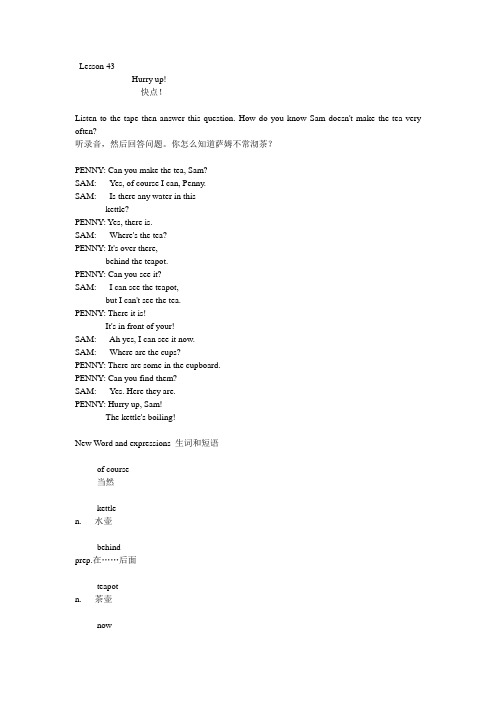
Lesson 43Hurry up!快点!Listen to the tape then answer this question. How do you know Sam doesn't make the tea very often?听录音,然后回答问题。
你怎么知道萨姆不常沏茶?PENNY: Can you make the tea, Sam?SAM: Yes, of course I can, Penny.SAM: Is there any water in thiskettle?PENNY: Yes, there is.SAM: Where's the tea?PENNY: It's over there,behind the teapot.PENNY: Can you see it?SAM: I can see the teapot,but I can't see the tea.PENNY: There it is!It's in front of your!SAM: Ah yes, I can see it now.SAM: Where are the cups?PENNY: There are some in the cupboard.PENNY: Can you find them?SAM: Yes. Here they are.PENNY: Hurry up, Sam!The kettle's boiling!New Word and expressions 生词和短语of course当然kettlen. 水壶behindprep.在……后面teapotn. 茶壶nowadv. 现在,此刻findv. 找到boilv. 沸腾,开参考译文彭妮:你会沏茶吗,萨姆?萨姆:会的,我当然会,彭妮。
萨姆:这水壶里有水吗?彭妮:有水。
萨姆:茶叶在哪儿?彭妮:就在那儿,茶壶后面。
- 1、下载文档前请自行甄别文档内容的完整性,平台不提供额外的编辑、内容补充、找答案等附加服务。
- 2、"仅部分预览"的文档,不可在线预览部分如存在完整性等问题,可反馈申请退款(可完整预览的文档不适用该条件!)。
- 3、如文档侵犯您的权益,请联系客服反馈,我们会尽快为您处理(人工客服工作时间:9:00-18:30)。
Yes ,of course I can,Penny.
Yes ,there is.
It’s over there,behind the teapot.
I can see the teapot,but I can’t see the tea.
There it is!
Ah yes,I can see it now.
Step 1 Before making the tea
kettle
tea
teapot
tea cups
Step 2 Boil the water
Don’t over-boil it!
Step 3 Shower them
Step 4 Put tea into it
fill half of the teapot with tea leaves
cupboard
Where are the cups?
PENNY:Can you find them?
Hurry up,Sam!
• 相关文化:英国人与茶 • 英国人爱喝茶(tea)是世界闻名的。据说茶是由英
王查理二世的王后凯瑟琳带到英国的。她出嫁时 从东印度公司购买了中国红茶100公斤,把它带到 英国王宫,她把喝茶当作一种宫庭乐趣。时至今 日, 茶是英国最流行的饮料,将近一半的人口喜欢 喝茶。人们普遍认为茶能医治百病,有的人竟到 了饭可以不吃,茶不可不喝的地步。一位英国剧 作家曾经说过:"While there is tea, there is hope。 "(有茶就有希望。)
• 英国人喝茶比较定时,习惯于三餐两茶。每天人
们工作、学习一段时间后,需要停下来休息一刻 钟左右,喝杯茶,吃点东西,这段时间叫tea break(茶休),茶休一般一天两次:morning tea(上 午茶)和afternoon tea(下午茶)。 • 上午茶一般在十点半左右,下午茶一般在下午四、 五点钟。 • 茶休在英国是"雷打不动"的休息时间p!
Everyday English
1.You asked for it! 你自讨苦吃! 2. Believe it or not! 信不信由你!
Can you make the tea?
Discuss
• How to make the tea? • What must I do at first?
Step 5 Washing the tea
• Pour boiled water into the pot • Wait a minute • Pour the water out of the pot
Step 6 Fill up the teapot
Fill up the pot with boiling water Wait for a little while again
Questions:
• 1. Is there any water in the kettle? • 2. Where’s the tea? • 3. Can Sam see the teapot? • 4. Can Sam see the tea? • 5. Where are the cups? • 6. Sam often makes the tea, yes?
OK!
a. Before making the tea b. Boil the water c. Shower them d. Put tea into it e. Washing the tea f. Fill up the teapot
How to make the tea?
Can Sam make the tea?
